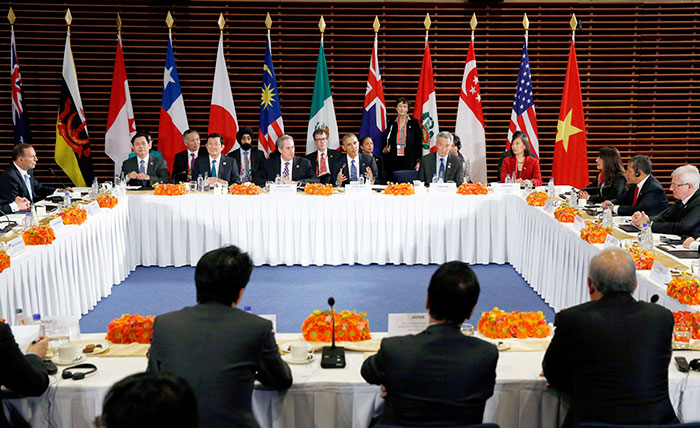Great strides thanks to economic integration
 |
| The 6tth meeting of the leaders of TPP members at the Sofitel Hotel, Manila, Republic of the Philippines |
These milestones have contributed to advancing economic development and helped the country to make significant progress in reforming institutions and improving transparency and competitiveness.
Before 1995, Viet Nam was known as a tiny but unyielding country during resistance wars, not a country with economic potential.
However, the introduction of the Viet Nam-US Bilateral Trade Agreement in July 2000 was considered as a manifesto to the world that Viet Nam not only normalized its relations with the US but also officially opened its economy to the number one power.
For the first time, Viet Nam was familiar with such concepts like opening market, investment commitments, national treatment, and non-discrimination rules.
Things changed remarkably after the agreement took effect in 2001. Viet Nam’s export revenue reached US$36.3 billion in 2014 compared to just US$1.51 billion in 2001.
Noticeably, Viet Nam has enjoyed trade surplus over years with US$2.45 billion in 2002, US$5.93 billion in 2005, US$14.24 billion in 2010, US$30.6 billion in 2014, and around US$39 billion in 2015.
Six years after signing the Viet Nam-US Bilateral Trade Agreement, Viet Nam became the 150thmember of the World Trade Organization.
The event created strong effect in luring foreign investment with the total registered volume soaring from US$10 billion in 2006 to US$21.3 billion in 2007 and US$64 in 2008.
Viet Nam’s exports rose 20%/year on average while distribution and retail sale services developed vigorously, evidenced by the appearance of modern supermarkets and trade centers.
The Tran-Pacific Partnership is another milestone as it touches upon new areas like Government procurement, labor, and environment among others.
It is estimated that the agreement would help expand the national GPD by US$23.5 billion by 2020 and US$33.5 billion by 2025. Export value is forecast to increase by US$68 billion by 2025.
Institutional improvements
There is no doubt that significant advances have been made in reforming institutions, improving competitiveness and business environment over the past years.
A series of important laws like the Law on Enterprises, the Law on Credit Organizations, the Law on Intellectual Property Rights, and especially the Law on Commerce have been revised to further define the right to business freedom.
Under the World Trade Organization rules, all laws and administrative decisions must be made public before the date of effect. Statistics show that Viet Nam has amended or issued 86 laws since the country joined the World Trade Organization.
The Trans-Pacific Partnership is a new-generation agreement with higher standards on transparency, anti-corruption, facilitation of corporate performance, which requires huge efforts in order to successfully grasp opportunities generated from the course of international integration.
What the stars mean:
★ Poor ★ ★ Promising ★★★ Good ★★★★ Very good ★★★★★ Exceptional
Latest News
More News
- Japanese business outlook in Vietnam turns more optimistic (January 28, 2026 | 09:54)
- Foreign leaders extend congratulations to Party General Secretary To Lam (January 25, 2026 | 10:01)
- 14th National Party Congress wraps up with success (January 25, 2026 | 09:49)
- Congratulations from VFF Central Committee's int’l partners to 14th National Party Congress (January 25, 2026 | 09:46)
- 14th Party Central Committee unanimously elects To Lam as General Secretary (January 23, 2026 | 16:22)
- Worldwide congratulations underscore confidence in Vietnam’s 14th Party Congress (January 23, 2026 | 09:02)
- Political parties, organisations, int’l friends send congratulations to 14th National Party Congress (January 22, 2026 | 09:33)
- Press release on second working day of 14th National Party Congress (January 22, 2026 | 09:19)
- 14th National Party Congress: Japanese media highlight Vietnam’s growth targets (January 21, 2026 | 09:46)
- 14th National Party Congress: Driving force for Vietnam to continue renewal, innovation, breakthroughs (January 21, 2026 | 09:42)
















 Mobile Version
Mobile Version